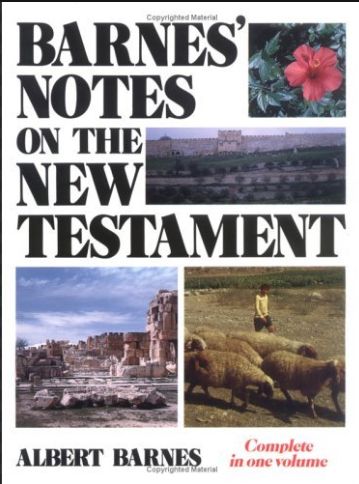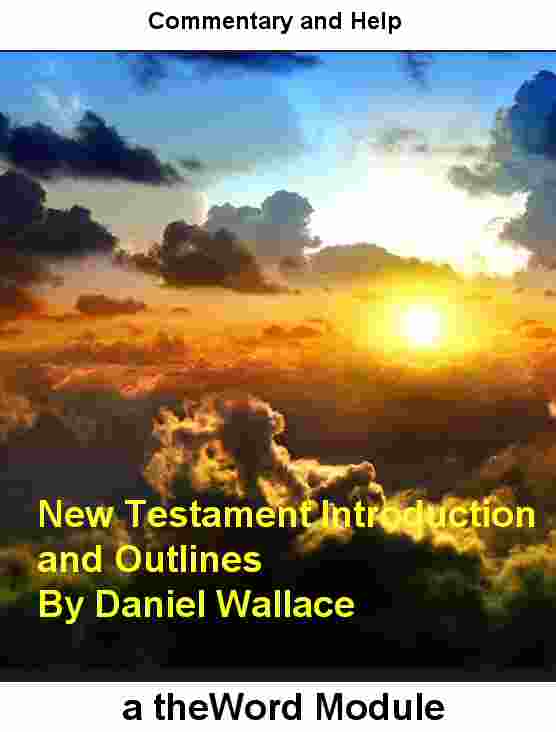
Barnes’ New Testament Notes
WLue777
- 0
Barnes New Testament Notes
Albert Barnes (1798-1870) was an American theologian, born at Rome, New York, on December 1, 1798. He graduated from Hamilton College, Clinton, New York, in 1820, and from Princeton Theological Seminary in 1823. Barnes was ordained as a Presbyterian minister by the presbytery of Elizabethtown, New Jersey, in 1825, and was the pastor successively of the Presbyterian Church in Morristown, New Jersey (1825-1830), and of the First Presbyterian Church of Philadelphia (1830-1867).
He held a prominent place in the New School branch of the Presbyterians during the Old School-New School Controversy, to which he adhered on the division of the denomination in 1837; he had been tried (but not convicted) for heresy in 1836, the charge being particularly against the views expressed by him in Notes on Romans (1835) of the imputation of the sin of Adam, original sin and the atonement; the bitterness stirred up by this trial contributed towards widening the breach between the conservative and the progressive elements in the church. He was an eloquent preacher, but his reputation rests chiefly on his expository works, which are said to have had a larger circulation both in Europe and America than any others of their class.

Knapp The Ethics of Eternal Punishment is a single chapter work on the everlasting or eternity of hell. Christopher Knapp is a brethren author.
PDF: Knapp The Ethics of Eternal Punishment
theWord: Knapp The Ethics of Eternal Punishment
MySword: Knapp The Ethics of Eternal Punishment
eSword: Knapp The Ethics of Eternal Punishment
Of the well-known Notes on the New Testament, it is said that more than a million volumes had been issued by 1870. The Notes on Job, the Psalms, Isaiah and Daniel found scarcely less acceptance. Displaying no original critical power, their chief merit lies in the fact that they bring in a popular (but not always accurate) form the results of the criticism of others within the reach of general readers. Barnes was the author of several other works of a practical and devotional kind, including Scriptural Views of Slavery (1846) and The Way of Salvation (1863). A collection of his Theological Works was published in Philadelphia in 1875.
In his famous 1852 oratory, “What to the Slave is the Fourth of July?”, Frederick Douglass quoted Barnes as saying: “There is no power out of the church that could sustain slavery an hour, if it were not sustained in it.”
Barnes died in Philadelphia on December 24, 1870.-bio
Download
Download “Barnes New Testament Notes” barnes-new-testament-notestw.cmt.twm – Downloaded 2189 times – 9.20 MBMore Modules on New Testament
- 30+ Commentaries on Romans
- Abbott-Abbott-Illustrated New Testament.cmt.twm
- Abbott, T.K. – Ephesians Colossians Commentary
- Alexander Epistles of John Commentary
- Alexander Expositor’s Bible Vol 48 Epistles of St. John
- Allen – Commentary on Matthew
- Allen Commentary on Acts
- Allusions in the New Testament in the ANF
- Amplified Bible Commentary (updated)
- Anderson – Types in Hebrews
Advertisement

Torrey Fundamental Doctrines of the Christian Faith is a set of 15 chapters on various doctrinal themes in the Bible. Some of these chapters are...
1. Inspiration, or to what extent is the Bible Inspired of God?
2. The Christian conception of God...
4. The Deity of Jesus Christ
5. Jesus Christ, a Real Man
6. The Personality of the Holy Spirit
7. The Deity of the Holy Spirit and the Distinction between the Father, Son and Holy Spirit
8. The Atonement...
9. The Distinctive Doctrine of Protestantism: Justification by Faith
10. The New Birth
11. Sanctification
12. The Resurrection of the Body of Jesus and of our Bodies
13. The Devil
14. Is there a Literal Hell?
15. Is Future Punishment Everlasting?
Published in 1918.
Downloads:
PDF: Torrey Fundamental Doctrines
theWord: Torrey Fundamental Doctrines
MySword: Torrey Fundamental Doctrines
eSword: Torrey Fundamental Doctrines
